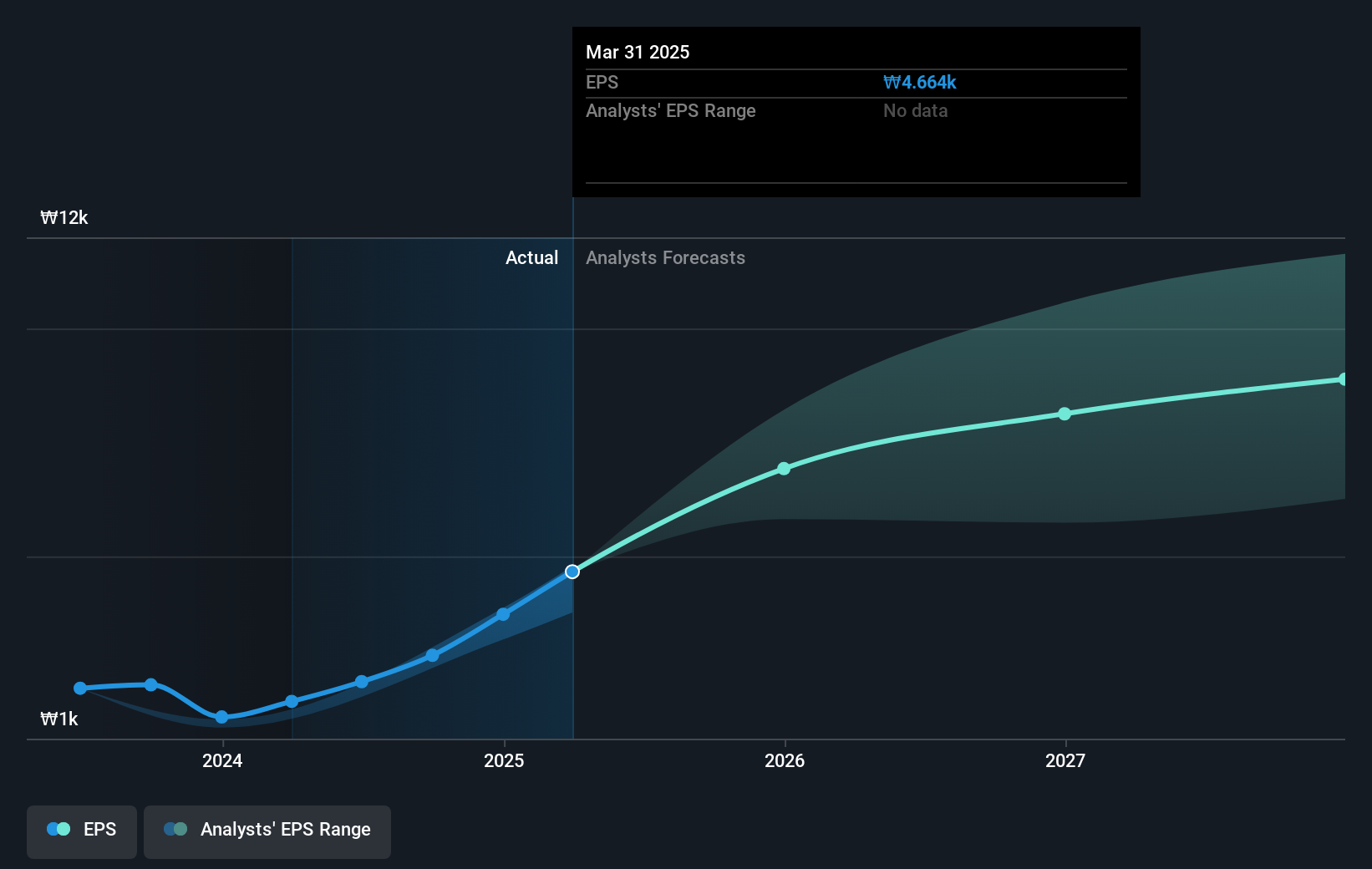Hyundai Rotem (KRX:064350) pops 11% this week, taking five-year gains to 877%
Long term investing can be life changing when you buy and hold the truly great businesses. And we've seen some truly amazing gains over the years. Just think about the savvy investors who held Hyundai Rotem Company (KRX:064350) shares for the last five years, while they gained 871%. If that doesn't get you thinking about long term investing, we don't know what will. Also pleasing for shareholders was the 75% gain in the last three months. This could be related to the recent financial results, released recently - you can catch up on the most recent data by reading our company report. It really delights us to see such great share price performance for investors.
Since the stock has added ₩1.7t to its market cap in the past week alone, let's see if underlying performance has been driving long-term returns.
In his essay The Superinvestors of Graham-and-Doddsville Warren Buffett described how share prices do not always rationally reflect the value of a business. By comparing earnings per share (EPS) and share price changes over time, we can get a feel for how investor attitudes to a company have morphed over time.
During the last half decade, Hyundai Rotem became profitable. Sometimes, the start of profitability is a major inflection point that can signal fast earnings growth to come, which in turn justifies very strong share price gains. Given that the company made a profit three years ago, but not five years ago, it is worth looking at the share price returns over the last three years, too. Indeed, the Hyundai Rotem share price has gained 676% in three years. In the same period, EPS is up 91% per year. That makes the EPS growth rather close to the annualized share price gain of 98% over the same period. So one might argue that investor sentiment towards the stock hss not changed much over time. Rather, the share price has approximately tracked EPS growth.
You can see how EPS has changed over time in the image below (click on the chart to see the exact values).

We know that Hyundai Rotem has improved its bottom line over the last three years, but what does the future have in store? It might be well worthwhile taking a look at our free report on how its financial position has changed over time.
What About Dividends?
As well as measuring the share price return, investors should also consider the total shareholder return (TSR). The TSR is a return calculation that accounts for the value of cash dividends (assuming that any dividend received was reinvested) and the calculated value of any discounted capital raisings and spin-offs. It's fair to say that the TSR gives a more complete picture for stocks that pay a dividend. In the case of Hyundai Rotem, it has a TSR of 877% for the last 5 years. That exceeds its share price return that we previously mentioned. This is largely a result of its dividend payments!
A Different Perspective
We're pleased to report that Hyundai Rotem shareholders have received a total shareholder return of 317% over one year. And that does include the dividend. Since the one-year TSR is better than the five-year TSR (the latter coming in at 58% per year), it would seem that the stock's performance has improved in recent times. Given the share price momentum remains strong, it might be worth taking a closer look at the stock, lest you miss an opportunity. It's always interesting to track share price performance over the longer term. But to understand Hyundai Rotem better, we need to consider many other factors. For example, we've discovered 1 warning sign for Hyundai Rotem that you should be aware of before investing here.
If you are like me, then you will not want to miss this free list of undervalued small caps that insiders are buying.
Please note, the market returns quoted in this article reflect the market weighted average returns of stocks that currently trade on South Korean exchanges.
Have feedback on this article? Concerned about the content? Get in touch with us directly. Alternatively, email editorial-team (at) simplywallst.com.
This article by Simply Wall St is general in nature. We provide commentary based on historical data and analyst forecasts only using an unbiased methodology and our articles are not intended to be financial advice. It does not constitute a recommendation to buy or sell any stock, and does not take account of your objectives, or your financial situation. We aim to bring you long-term focused analysis driven by fundamental data. Note that our analysis may not factor in the latest price-sensitive company announcements or qualitative material. Simply Wall St has no position in any stocks mentioned.
 Wall Street Journal
Wall Street Journal